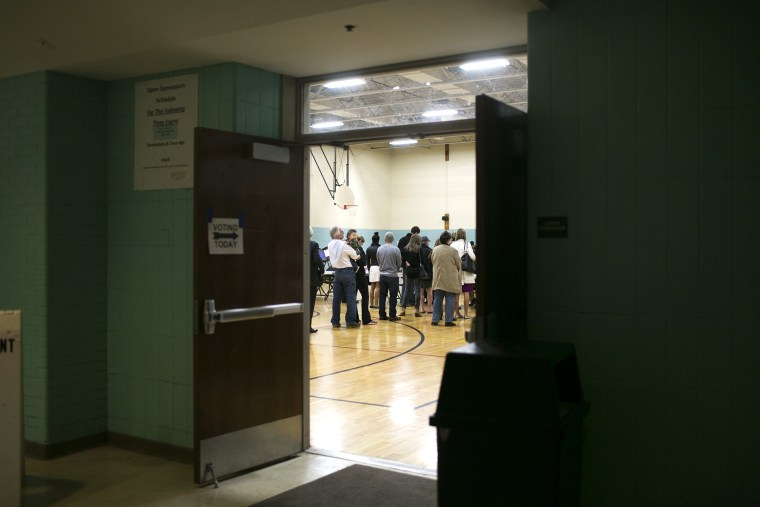The most important state in this year’s presidential election is illegally removing thousands of voters from the rolls, a new voting rights lawsuit alleges.
Ohio currently cancels the registration of people who don’t vote in three successive federal elections, or any of the intervening local elections — a procedure known as the Supplemental Process. Last year, around 40,000 people were removed from the rolls of Ohio’s largest county, Cuyahoga, a Democratic stronghold. Stuart Naifeh, a lawyer with Demos, said that suggests "tens or hundreds of thousands" of people were removed statewide last year alone.
“We have spoken to purged voters from around the state of Ohio who tried to vote in the November 2015 local election and were turned away,” said Freda Levenson, legal director for the ACLU of Ohio, in a statement. “The already widespread disenfranchisement that has resulted from this process is likely to be much worse in a presidential election year.”
The lawsuit, filed by the ACLU of Ohio and Demos, a voting rights organization, on behalf of two Ohio-based community groups, claims that the practice violates the National Voter Registration Act, known as Motor Voter. Motor Voter bars states from using a process that leads to people being removed solely for failing to vote, without any other reason to believe a person has moved. The suit also says Ohio’s use of the Supplemental Process is unnecessary, because the state also uses change-of-address data provided by the Postal Service to remove voters who move.
Naifeh said an analysis of the zip codes of the voters who were removed in Cuyahoga County, which includes Cleveland, showed that they came disproportionately from black and Hispanic neighborhoods.
Ohio Secretary of State Jon Husted’s office has said the Supplemental Process is legal and helps to keep the state’s voter rolls accurate and up-to-date. Husted is named as the defendant in the suit.
“Ohio manages its voter rolls in direct compliance of both federal and state laws, and is consistent with an agreement in this same federal court just four years ago," Husted said in a statement issued Wednesday afternoon in response. “This lawsuit is politically motivated, election-year politics, is a waste of taxpayer dollars and opens the door for voter fraud in Ohio.”
In December, the voting rights groups sent a letter to Husted demanding that the state stop illegally removing voters, and threatening litigation if it continued.
Everyone agrees that state voter rolls need to be cleaned up. A 2012 Pew report found that one in eight voter registrations are no longer valid or significantly inaccurate. But in the past, some states have been too aggressive in removing names, leading to large numbers of voters being disenfranchised. In 2000, Florida, at least 1,100 eligible voters were wrongly removed in a badly flawed purge of the rolls, perhaps swinging the presidential election to George W. Bush.
This is hardly the first time Husted, a Republican who is eyeing a run for governor in 2018, has been in the crosshairs of voting rights advocates. In 2014, he issued new rules that cut the early voting period on weekday evenings and Sundays, threatening to end the Souls to the Polls drives conducted by many black churches on Sundays. After a lawsuit, some of the Sunday hours were restored in a settlement.
State Rep. Kathleen Clyde, a Democrat, has offered a bill that would allow the state to remove voters from the rolls only if they’re confirmed to have moved out of state. It would not affect the process of removing dead voters.
